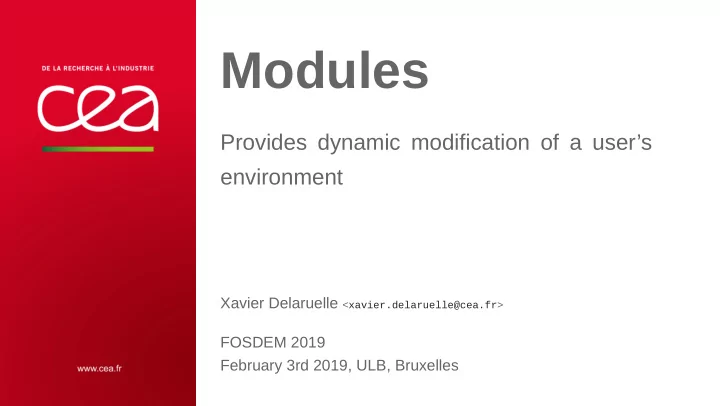

Modules Provides dynamic modification of a user’s environment Xavier Delaruelle < xavier.delaruelle@cea.fr > FOSDEM 2019 February 3rd 2019, ULB, Bruxelles
What is this about? An open source tool that can ease your day-to-day terminal console work Project is called Modules (or Environment Modules for disambiguation)
whoami I am Xavier Delaruelle Environment Modules project leader since July 2017 Work at CEA, a large research institute in France In the High Performance Computing (HPC) field
Traditional shell environment configuration Everything is put in the shell init file ( .bashrc , .profile , .zshrc , .tcshrc , ...) How to track what have been configured? (hard to distinguish what you have set from the global system setup with env / printenv ) How to work with the same user account on multiple projects whose setup are mutually incompatible?
How the Modules project may help? It defines a shell function called module That changes the state of the current shell (environment variables, shell aliases) By loading modulefiles representing set of environment changes Loaded modules are tracked thus they can be unloaded to restore previous environment
How does it work? The modulefiles Modulefiles are scripts describing a set of environment changes Written in Tcl + specific environment handling commands: https://modules.readthedocs.io/en/stable/modulefile.html
How does it work? The modulecmd.tcl script modulecmd.tcl evaluates the sub-commands passed to it to output shell code Interprets the modulefiles to produce the shell code to load or unload them
How does it work? The module shell function module shell function calls modulecmd.tcl script and eval its output to update current shell session
Activate catalogs of modulefiles Modulepaths are directories containing modulefiles When a modulepath is enabled, module search in it to find any modulefiles specified with their short name
Display content of modulefiles Show the modulefile-specific commands written in a given modulefile
Complex modulefile load Resolve dependencies between modulefiles to automatically load or unload them
Save your current environment in a collection Dump current list of enabled modulepaths and loaded modulefiles in a module collection
Restore a saved environment First, unload enabled modulepaths and modulefiles that are not defined in the collection Then, load modulepaths and modulefiles to match the environment state described by collection
As a sysadmin, what Modules could do for you? On shared systems, multiple group of users may have conflicting software needs Group 1 wants software a in version 1 whereas Group 2 wants it in version 2 Cannot used standard installation paths to satisfy everybody xkcd.com
As a sysadmin, what Modules could do for you? Give access to complex software catalogue
As a sysadmin, what Modules could do for you? Write shell-agnostic environment guidelines Users will also want to use the shell they are used to: bash , ksh , tcsh , fish , ... Hard to address guidelines to all of them To use the most recent version of GCC: BASH/KSH/ZSH: export PATH=$PATH:/apps/gcc/8.2.0/bin CSH/TCSH: setenv PATH $PATH:/apps/gcc/8.2.0/bin FISH: set -xg PATH $PATH /apps/gcc/8.2.0/bin With the module command, it can be simplified: To use the most recent version of GCC: module load gcc/8.2.0
Current shell and script language support Most common shells supported: sh · bash · ksh · zsh · csh · tcsh · fish · cmd Also supports scripting languages: tcl · perl · python · ruby · cmake · R
Where is Modules used? Modules documentation readers across the world
Project’s status Environment Modules project has a sustained development pace 2 feature releases and multiple bugfix releases per year Well integrated in OS repositories RedHat/CentOS/Fedora: yum install environment-modules Debian/Ubuntu: apt-get install modules openSUSE: zypper install Modules Homebrew: brew install modules FreeBSD: pkg install modules https://repology.org/metapackage/environment-modules/versions
Development trends Automatically solve and apply these dependencies when loading or unloading modulefiles Implement similar approaches and feature that can be found with package manager tools (like dnf , apt , etc)
Cool stuff to be developped Modulefile cache Expiring modulefiles Support for modulefiles written in Python module stash à la git , relying on collections
Contributions are welcomed Many topics to work on (new shell to support, additionnal modulefile command, support of modulefile written in different languages, <your idea here> ) Heavy non-regression testsuite to guide developpers More than 8000 tests Code largely covered Continuous integration against on multiple Linux distros, OS X, FreeBSD and Windows
Thanks for your attention Website: http://modules.sourceforge.net/ Code: https://github.com/cea-hpc/modules Documentation: https://modules.readthedocs.io Questions, feedback, new use-cases, want to participate: modules-interest@lists.sourceforge.net
Commissariat à l’énergie atomique et aux énergies alternatives DAM Centre de Bruyères-le-Châtel | 91297 Arpajon Cedex DIF T. +33 (0)1 69 26 40 00 | F. +33 (0)1 69 26 40 00 Établissement public à caractère industriel et commercial RCS Paris B 775 685 019
Recommend
More recommend